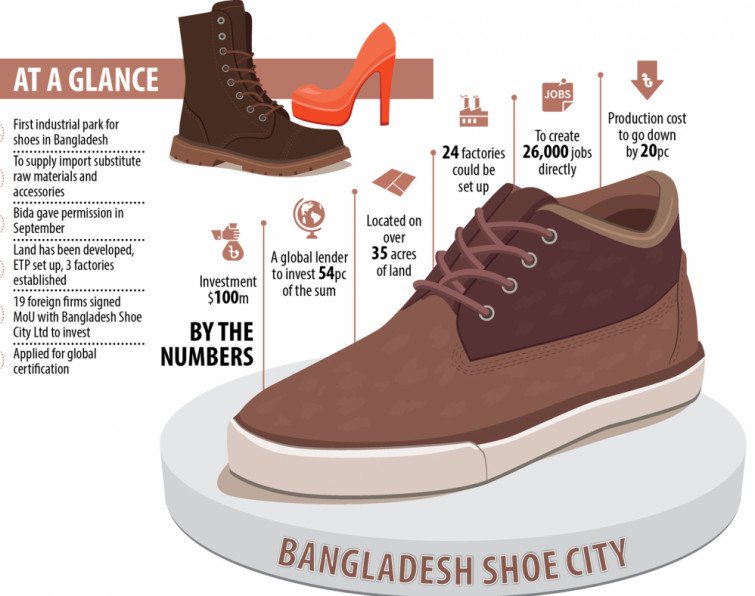A top footwear manufacturer is setting up a shoe industrial park, the first of its kind in Bangladesh, to supply import substitute raw materials and accessories to producers, boost exports and attract foreign investment. [First industrial park for shoes shaping up – The Daily Star]. The industrial zone sits on 35 acres of land that could house 24 factories.
The Bangladesh Investment Development Authority (Bida) gave the permission for the establishment of the Bangladesh Shoe City Ltd in September. Nasir Khan, chairman and managing director of Jennys Group, is the founder of the park.
The park, which is being set up in Gazipur, would cost around $100 million, or Tk 900 crore. Of the sum, Khan's equity is 46 per cent and a global lender will provide the rest.
"I have already received the green signal from the global lender about the financing," he said. He did not disclose the name of the lender since no agreement has been inked yet.
The park is located over 35 acres of land where 24 factories could be accommodated. The land has been developed.
Jennys Group has already set up three factories, including a shoe manufacturing unit.
The footwear sector needs at least 152 items to manufacture a piece of shoe. Of them, 50 major items will be produced in the park, Khan says.
Bangladesh is yet to establish a supply chain for the leather and footwear sector although the Asian Development Bank (ADB) thinks there are possible strong backward linkages thanks to mostly locally sourced raw materials, an abundant supply of low cost, trainable labour, and its advantageous location.
Khan says buyers want timely delivery of products apart from quality and compliance. But Bangladesh's export-oriented shoemakers struggle to maintain the lead-time since there is no backward linkage industry.
So, manufacturers have to import raw materials, accessories and leather to make products for international buyers, which is time-consuming.
"As a result, global brands do not feel interested in placing orders in Bangladesh though our manufacturers are capable of ensuring quality," Khan said.
The setting up of the park would help change the scenario.
Manufacturers will get all accessories from the park, which will help reduce the lead-time and minimise the cost of production by at least 20 per cent.
"This will make the sector competitive and boost exports," said Khan.
The tannery industry in Bangladesh does not have the certification from the Leather Working Group (LWG), a not-for-profit organisation responsible for the world's leading environmental certification for the leather manufacturing industry. This acts as a major barrier as exporters can't use local leather for global markets.
"So, I have decided to provide all raw materials under one umbrella," said Khan.
The construction of the effluent treatment plant (ETP) has been completed. Bangladesh Shoe City Ltd needs to meet some more requirements to obtain the LWG certification.
Already 19 companies from Japan, Russia, Italy, China, Portugal, Sri Lanka, and Taiwan have signed memorandum of understanding with Bangladesh Shoe City Ltd to make investments.
The park has received investment proposals from foreign investors involving 450 crore of Tk (4.5 billion) and this can reach up to 1,000 crore of Tk (10 billion). It will directly create 26,000 jobs.
Md Ziaul Huq, a director-general of the Bida, says the project has potential.
"We need this type of industrial park to boost exports from the footwear and leather sector," he said.
Investors who plan to invest in the park will have to register with the Bida. Then they will be recommended to secure all investment facilities, including the bonded warehouse facility.
Bangladesh has major advantages in developing its leather industry, according to the ADB.
Leather from Bangladesh is highly reputed for its good quality, and leather goods and footwear factories are able to meet the high demands of foreign buyers, it said in an analysis in 2018.
The leather industry has the potential to develop the entire supply chain—starting from raw leather to leather processing, to production of footwear and leather products, domestically, said the Manila-based lender.
According to the feasibility study, the industrial park will help fetch an additional $1 billion from the exports of leather and footwear products.
The sector earned $941.67 million from the shipment of leather, leather goods and footwear in the financial year of 2020-21.

